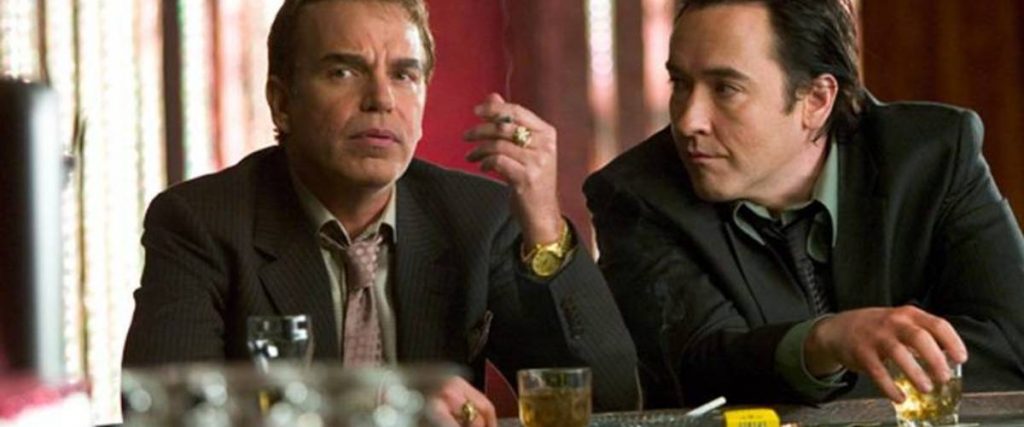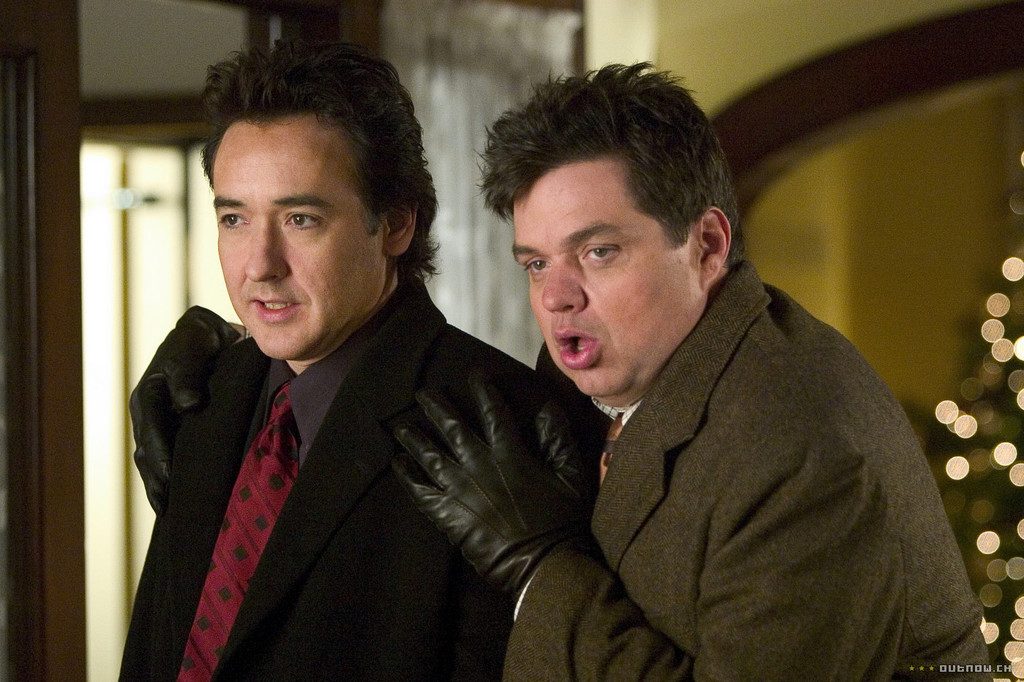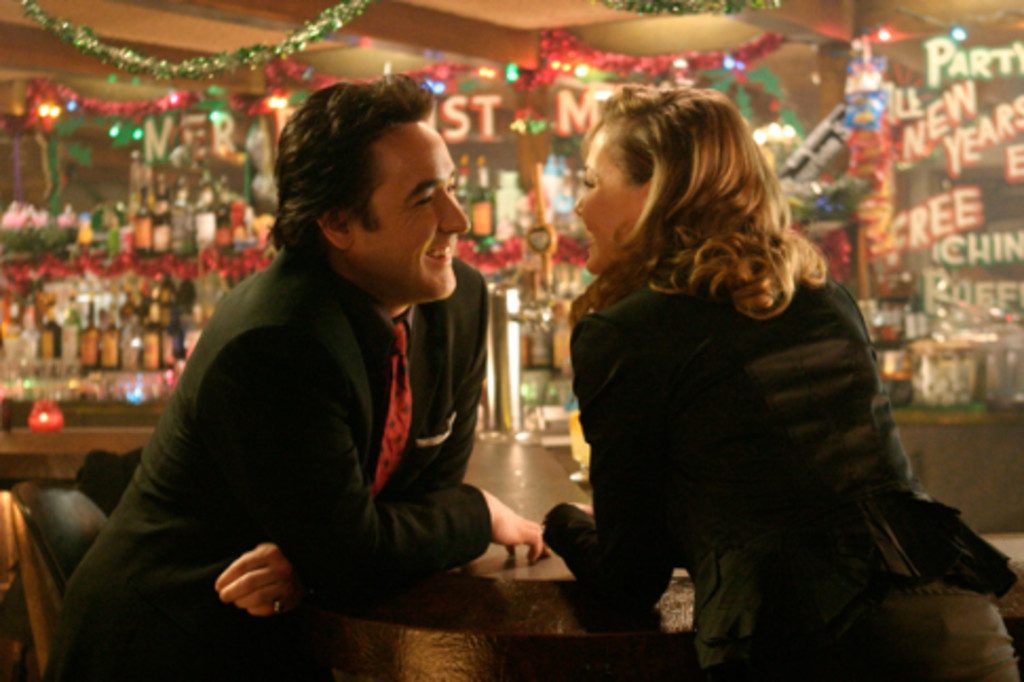The world is too messed up to obsess over bad movies as much as we do; isn’t it time we obsess over good ones? In his monthly column You Have To See This, Chuck Winters reaches into his pile of flawed, forgotten, or just plain fascinating gems to figure out what makes them tick and what makes them matter.

I’ve always had a vague understanding of what “noir” is: crime, death, femme fatales, etc. But for whatever reason, I’ve never bothered to actually study what defines “noir.” A fair share of cinephiles celebrated last month as “Noir-vember”; because after 31 days of exploring your fears with horror movies, why not take another 30 exploring your darker, more rational impulses? I had an idea for this—one that thankfully happens to tie in with the Holiday season—but before I embarrassed myself, I thought I’d ask my friend Libby Cudmore (who, not for nothing, is an awesome writer whose book you should buy the crap out of) how she would define noir:
The best definition of noir I ever heard is ‘When bad things happen to bad people.’ It’s temptation… greed, lust, wrath, all the dark parts of ourself that we finally give into when an easy pass comes to be… and by the time we figure out how fucked we are, we’re fucked beyond all salvation.
Harold Ramis is a surprisingly easy guy to underestimate, considering he’s the guy that co-wrote Animal House and Ghostbusters and directed Caddyshack and Groundhog Day. Much of that may be owed to the fact that he also directed Club Paradise, Stuart Saves His Family, and Year One. Still, there’s strength in how thoroughly he considered his material, which leads to movies like Analyze This and his take on Bedazzled catching you off guard with how heavy they can be for “Robert DeNiro lampoons his history playing made guys” and “Brendan Fraiser goofs off while Elizabeth Hurley plays dress-up.”
Which leads us to 2005’s The Ice Harvest, based on the novel by Scott Phillips, adapted by Robert Benton and Richard Russo (the minds behind 1998’s Paul Newman private eye thriller Twilight, not to be confused with the 2008 vampire romance; Benton is a legendary figure in his own right, having written and directed Kramer vs. Kramer). Don’t feel bad if you didn’t realize that this existed; it debuted at #10 at the box office and was met with a big shrug by the critical community. If you look at some of the pull quotes out of Rotten Tomatoes from “top critics,” you’ll see unfavorable comparisons to Sin City, Bad Santa, and Groundhog Day. People were expecting a comedy…because that’s how it was marketed, as a black comedy.
This is normally the point where I’d embed a trailer so you could see for yourself, but I’m foregoing that tradition because the trailer does such a powerful disservice to the film that even now it would actively hurt your enjoyment. Don’t get me wrong, the film is a comedy, but it’s not gutbustingly funny—a little like how some quality chocolates are more bitter than sweet. Aside from the trailer being fairly spoilery, all the laugh lines are pulled out of context to create the illusion of a film chock-a-block with violent, madcap hijinks. In reality, this film is a lot more casual in its pacing and presentation…and it’s at least 90% of the way to my friend Libby’s definition of noir.
The film opens with Charlie Arglist (John Cusack) debunking the myth, via voiceover, of there being no such thing as the perfect crime; he explains that if you’re patient, if you’re smart, if you think of every last detail, there’s nothing stopping you. This voiceover plays as Charlie makes a large cash withdrawal from a bank in Wichita, Kansas; over two million dollars, he tells us, in the droll voice of a man who knows he’s already dead: “Ho ho fucking ho.” From there we go into the opening credits, playing mostly over shots of a nativity scene as a choir sings “The Little Drummer Boy.” It’s a gray, shitty evening, and instead of a gentle, seasonal snowfall, a heavy freezing rain is falling on the scene.
That’s the kind of comedy this comedy is: trading on little, bitter ironies rather than goofy set-pieces and snappy one liners. The film is happy for you to laugh out loud at its black sense of humor, but it’s going for a smirk and a headshake.
So about that two million dollars: Charlie and his partner Vic Cavanaugh (Billy Bob Thornton) have been quietly skimming from their mob boss employer, Bill Guerrard, and on Christmas Eve, they’ve finally collected on their efforts. All they have to do is wait out this ice storm that’s hitting Wichita, then they’re on the next plane to anywhere else. Somewhere sunny. Somewhere Guerrard can’t touch them. It’s hard to tell what’s more important to Charlie.
Anybody who knows their crime movies can tell you that keeping cool is often the hardest thing about doing crimes in movies, right next to the whole “honor amongst thieves” thing. Charlie’s the “ideas guy,” the one who figured out how to skim from his boss’ books in the first place, while Vic is the dreamer who pushed Charlie into it. After an awkward but seemingly friendly conversation about who should hold on to the money (Vic), it’s pretty clear who wears the pants in this partnership and who intends to screw who. But we’ll get to that.
For now, after quickly laying out the situation and establishing the principals, Ramis pumps his brakes and takes you on a leisurely tour through Charlie’s world. Again, it’s Christmas Eve in the midwest; anybody with any measure of success or support is spending the night with loved ones. The people that are out tonight are the dregs: aging losers so hurting for holiday companionship, they turn to their local strip clubs. Adorably dumb dirty cops, desperate for a little recognition from the guys up the food chain. And shiftless drunks like Pete Van Heuten (Oliver Platt), who married Charlie’s ex-wife after she divorced Charlie and is now on the outs with her himself.

A good third of the movie has Charlie ferrying a loaded Pete around Wichita, even though Pete doesn’t figure into the criminal plot. Most people would call this a sign of shit pacing; they’re not wrong. This is also where most of the film’s overt comedy comes from, and it’s easy to assume that it’s all in there just for “laughs.” It’s not without purpose, though: Pete’s our guide to Charlie’s life and state of mind, which is oddly downbeat for a guy who just stole two million dollars and is this-close to getting away with it. Sure, he’s buying everyone drinks and acting extra nice to the people in his life, but there’s something perfunctory about it, like he’s doing it because it’s what you do when you’re about to blow town, not because he’s particularly happy or excited. When Pete confesses that he was sleeping with Charlie’s wife while they were still married, Charlie tacitly admits that he knew and shrugs it off. And when the two of them actually visit the ex at her family home, Pete is making a scene, but Charlie doesn’t say or do much besides hang out at the fringes of the dinner table, hug his children (one of whom hates his guts) and trade cordialities with the ex.
Cusack gets a monologue about a third of the way through the film that explains all of this in a really interesting way I’d rather not ruin, but the upshot is this: Charlie made this move with Vic out of a desperation that came from a deep, deep sense of nihilism and existential dread. He’s got enough sense of self-preservation left in him to make himself scarce whenever Guerrard’s bagman Roy Gelles (Mike Starr) comes calling, but Charlie has seemingly accepted that this is going to end however it’s going to end. Charlie isn’t some guy with an already good-ish life, who makes amoral choices looking for that little bit extra and is doomed to pay for them. That’s more Vic, who already has a great house and (from what little we know of her) a gentle, loving wife, but feels compelled to escape Wichita for the same reason a middle-class man would buy a Corvette after turning 45. Charlie has almost nothing worth holding onto in Wichita, and he is so fucking done with it that he’d rather die trying to get out.

The one exception is Renata Crest (Connie Nielsen), whom we’re also introduced to in this long stretch of “nothing happening.” Charlie’s clearly sweet on the striking Renata, who runs the day-to-day of one of the strip clubs Charlie launders money through; she’s intelligent, sussing out that he’s leaving town after watching his behavior toward her and other people, and she’s imposingly beautiful, standing out amongst the riffraff that populates her club. Charlie wants her to come with him, and Renata’s interested, but first, he has to get the money after a careless Vic is seemingly captured by Gelles.
At this point—about halfway through this 90-minute movie—the plot comes roaring back to the forefront, and now that we have this full understanding of where Charlie’s coming from, it is a BLAST to watch him work. Vic might have encouraged Charlie to go through with this operation, but Charlie’s still the mastermind, and the film never forgets it as he stays barely a step ahead of the multiple complications coming his way. Very rarely, however, does the film hold your hand and explain Charlie’s thought processes. It trusts you to see the cracks in the stories he’s being fed, the faults in how people express certain feelings to him. Like his protagonist, Ramis plays it cool, and the result is much more than a movie that’s “violent” or “funny.” If you’ll pardon the very necessary pun, The Ice Harvest is ice-cold.

Earlier I said that, by my friend’s definition, this film is about 90% of the way to a full-blown noir. That’s because Charlie ultimately gets away scott free, though I’ll leave it to you to discover whether or not he does so with the money and/or the girl. The last shot of the movie, of him driving down a lonely road with an overcast sky above, doesn’t suggest that he’ll find happiness. But the fact that he gets away regardless, and that the rest of the movie hews so closely to that simple idea of “bad things happening to bad people,” raises interesting questions (at least from this neophyte’s perspective) about the nature of noir. Is it more accurate to suggest that the greatest sin of noir is a betrayal of the self? To throw away your own principles for that so-called easy pass, or to even have pretended to have such principles in the first place? At any given point in the film, Charlie knows exactly who he is and doesn’t pretend to be anyone else (though, as he constantly reminds a drunken Pete, he’d rather not be called a mob lawyer in public). Maybe that makes the film more of a heist thriller, or even a general crime thriller, than an actual, no-bullshit noir.
Either way, all that’s from the guy who made his bones on busted ghosts, dancing gophers, and Punxsutawney Phil. Aren’t you a little curious?
If you know of any movies that you think deserve to be covered in You Have To See This, feel free to tweet your suggestions to @DivisionPost.
